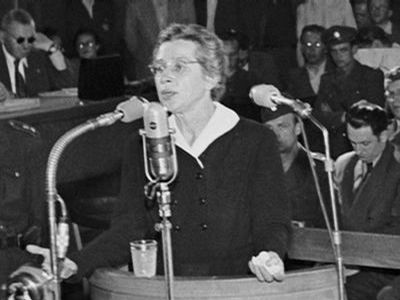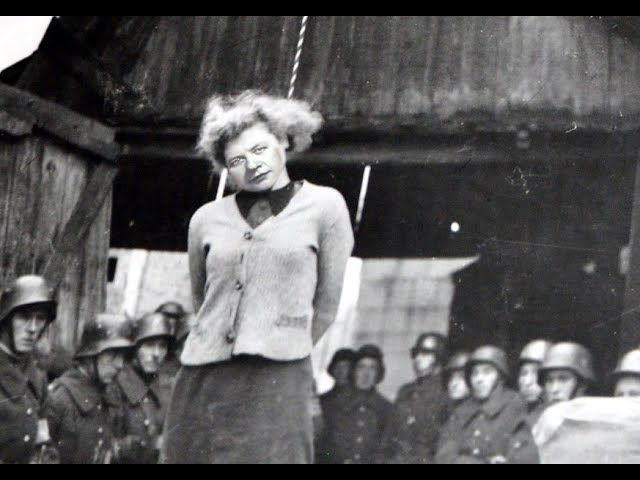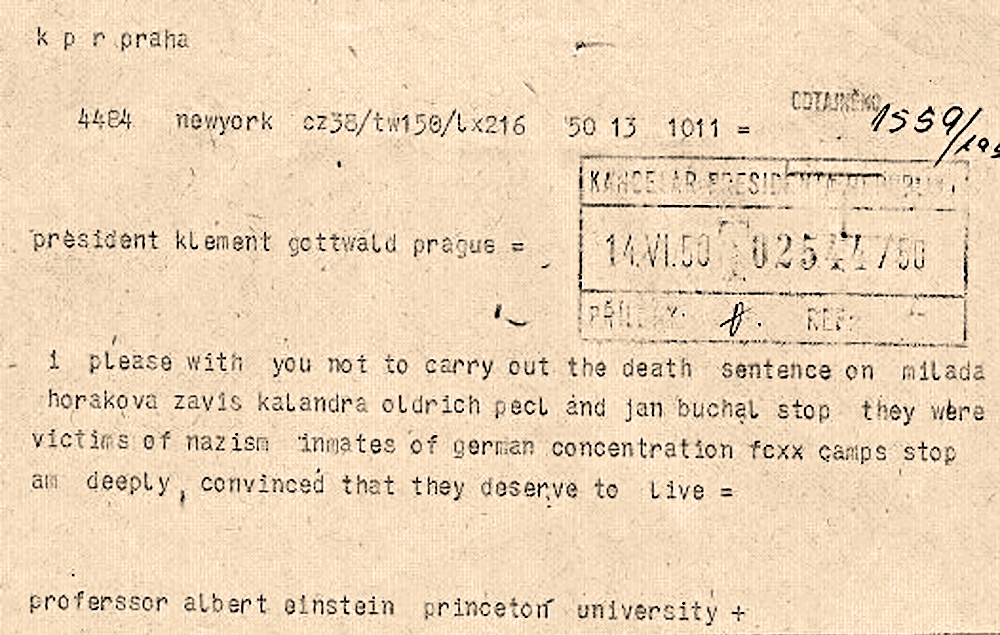"Nothing is more powerful than an idea whose time has come."
Alternate Website Access:

Milada Horakova enemy of the state, Zavražděna komunisty
Share (Alt) Idaho 1N, Idaho 2, Idaho 4NE, Idaho 4NW, Idaho 4SE, Idaho 4SW, Idaho 5, Idaho 6, Idaho 7, Idaho 8, Idaho 9, Idaho 10, Idaho 11, Idaho 12, Idaho 13, Idaho 14, Idaho 15

“Jana my only little daughter, my treasure from God. When you grow up you will surely wonder how it came to be that your mother lived the way she lived, namely quite unconventionally. Maybe you will understand me then, better than I now understand myself. I changed my mind many times, rearranged values, but that which has remained unwavering within me, and without which I can’t imagine living without is freedom of conscious. My conscience is clear and I hope and believe and pray that I shall also pass the test of the highest court, of God. Please consider my little darling whether I was right. I kiss your hair, your little eyes, and your mouth. I hug you closely in my arms; I did not do this enough when I could. I will always be with you, remember me”
Milada Horakova, Pankrac Prison, Prague Czechsolovakia; June 27, 1950 before her execution by hanging.

Since 2004, the Czech Republic has commemorated June 27th as the Day of Remembrance for the Victims of the Communist Regime.
What were Milada’s crimes? She fired no shot, raised no arms, nor were any detailed plans for violent insurrection ever discovered. Milada refused to consent to the authority of the state and remained strident in her public criticisms. This is the same charge used by all tyrannical regimes against their perceived opposition, it threatens their legitimacy. Moreover, the entire proceeding was sanctioned by the courts of law, and the Czech Prime Minister, Edward Benes, signed the legal document authorizing her execution. He did not have to sign her death sentence, he could have refused to do so, he could have honored his oath to the Czech people and their constitution, he could have selected not to participate, but he gave his consent instead. Her execution was legal, authorized by the current head of state. Was it justice? When her death sentence was given by a “judge”, the outrage from the international community resulted in letters from Winston Churchill, Eleanor Roosevelt, and even Albert Einstein begging for clemency, but all were ignored.
 telegram from Albert Einstein
telegram from Albert Einstein
What makes Milada so unique is not that she was the only woman and Minister of Parliament charged in a “Show trial” and executed, but that her trial was broadcast live to the entire nation. The reason why it is called a “show trial” is because the verdict is already known, and all the characters are understood to play their parts. In fact, the prosecution would often draft the “confession” script for the accused to sign and read in court. Almost everyone just played their part, the cost to them, their families, their reputation, was just too great to imagine.
Milada, choose not to read from the script, she choose to claim, use, and defend her rights. (I have been unable to locate a full transcript of her testimony in English, should it be available we will forward to you for your review). During the trial, in spite of the ever increasing torture and threats to her children and family, Milada remained defiant until the end. Please take a moment to re-read the quote at the beginning of this article, these words were from one of several letters she wrote from her prison cell, which the government were so afraid of the public learning, they remained locked in secret state police archives until after the Velvet Revolution in 1989. (Should you wish to better understand the tactics of this trial and how the mechanics of “show trials” worked and how the same tactics are in play here in Ada County, here is a link to the English version of the Musem Kampa webpage dedicated to Milada: https://www.museumkampa.cz/milada-horakova-en/ )
Unfortunately for Milada, this was not her first experience in fighting for her rights in existing courts of law. In 1939, the western allies, under the direction of Neville Chamberlin negotiated a, “Peace Treaty”, with the National Socialist Party of Germany, and their leader in Munich. The Czech’s were not consulted much about the terms, and after the deal was reached, the allies refused to allow the Czech Parliament to even conduct a vote on the treaty. As a final insult, the Czech military were ordered to present themselves in full military gear to surrender arms and equipment to the Wehrmacht. Some did, some did not surrender, and some brave Czech’s chose to use their arms, rather than turn them over to their new German occupiers.
In fact there is a People’s Rights member, whose relative was a General in the Czech armed forces, and he fled to the west rather than surrender to the Germans. He did not take his family with him, because the custom of the time was to leave family members alone. However, the Germans did not follow this custom, and using the sanction of the existing Czech courts and law, found his wife to be a criminal, and she was sent to various German Prison and Concentration camps. Again, these were the exact same courts and judges, which existed before the occupation, now were still operating under a new government philosophy, would you consider justice possible under these circumstances?
(There is an excellent film about 2 Czech piolets, who after surrendering to the Germans, fled to England, to become fighter pilots in the battle of Brittan, then return home after the war only to be placed in prison camps by the Czech communists. “Dark Blue World: https://www.youtube.com/watch?v=FvFk6i8YQtc )
Milada joined the Czech resistance to German National Socialism, unfortunately in 1940; she was arrested by the Gestapo and sent to Terezin Concentration Camp, then on to other German prisons. In 1944 she was placed on trial in Dresden, the prosecution demanded the death penalty. Fortunately, Milada declined German provided council, and choose to represent herself (having earned a law degree from Charles University in Prague 1926), her skills helped reduce her punishment to only an 8 year prison sentence. She was liberated from German prison by American Armed forces in April 1945. She returned to Czechoslovakia, in 1945 after allied liberation and was elected to parliament in 1946. In 1948, when the Communists came to power, she chose to resign from government in protest, but unlike most opposition party members, who fled to the west, she chose to remain to claim, use, and defend her rights.
There is an excellent film about Milada and her life released in 2017, here is the trailer. https://www.youtube.com/watch?v=NKbvYs_-Sto&t=20s
It is difficult for Americans to be skeptical of their court system because many have not experienced their existing legal systems and same court buildings under Nazi or communist control, the way it was from Milada and millions of Czech citizens. However, our founding fathers were very well aware of the importance of administering true “justice”, in the preservation of liberty. That is why in colonial America, when a crime complaint was registered with the local Sheriff, the Sheriff had to find 12 citizens, who knew the alleged defendant and were asked to state whether or not they were capable of committing the crime alleged. Until the sheriff could find 12 people, who actually knew the defendant and would agree that the individual was potentially able to commit the alleged crime, no charges would be brought and no trial would commence. This is a very high bar and worked very well to prevent the government from bringing charges. Moreover, because most likely people in the community of the defendant would sit in judgement of them, they already knew the person and could make a more informed decision about the guilt or innocence. Over time, the English Crown grew to have more disputes with the American colonials and found it difficult to enforce the will of the crown in the courts run by those same colonials. As the revolutionary sentiment grew and more and more acts of sedition against the crown increased. The British government kept bringing charges against patriots, and kept losing. Part of the reason, is that the grievance of the defendant was also a shared grievance by a member of the jury, so people kept getting found not guilty. In an act of desperation, the English Crown abolished colonial courts and replaced them, with Judges from England, or also used Military courts. Some would say the loss of the courts was the final catalyst, which lead to the armed rebellion against the English Crown. Can you blame them?